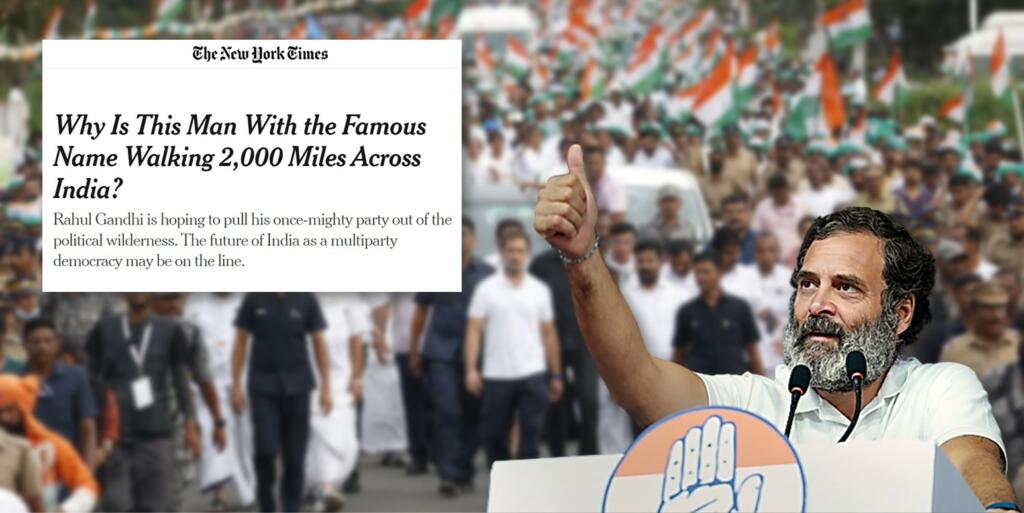Twitter Files: We are almost approaching the end of 2022. December has already begun. If I ask you, how do you look at the year, the answer can come as per your personal experiences. However, an independent nation celebrating ‘Adazi Ka Amrit Mahotsav’ was a remarkable year as there have been several measures to replace the obvious vestiges of colonial rule. Be it changing the naval ensign or the installation of Subhash Chandra Bose’s statue at the India Gate.
Despite all this, the prime minister dedicated a major portion of his Independence Day address to decolonisation. He emphasised on shedding the colonial mindset and taking pride in our roots. So, are we free from colonial clutches?
NYT in awe of Bharat Jodo Yatra
The New York Times, often hailed as one of the biggest newspapers of the West, is very interested in Indian politics. Why? I will get to that later. First let’s have a look at the recent update.
On 3rd of December, the NYT published an article authored by Sameer Yasir titled, “Why is this man with the famous name walking 2,000 miles across India?” The article contains an image of Rahul Gandhi and the media house claims that the author has travelled to Burhanpur, India to report on the Bharat Jodo Yatra.
As per the article, Rahul Gandhi was great enough to compromise all his luxuries, the silver spoon he was born with and it was very great of him to get himself covered in dust. The publication seems amazed at the Gandhi scion meeting with the general public, obviously the dynasts don’t do that much.
The article suggests that the walk had the potential to determine India’s political future, as the general election is due for 2024. However, after making a hero out of the Gandhi scion, the article realises that the Bharatiya Janata Party will govern the country for decades to come, because of the deep imprint they have.
NYT’s special interest in Rahul Gandhi
NYT hails Rahul Gandhi for taking the onus of reviving the grand old party upon himself, but seems upset about back-to-back debacles Congress has been facing under his leadership.
Well, it is not new for the New York Times to prostrate at the lotus feet of Rahul Gandhi. Every time the Nehru-Gandhi family has tried to launch the Gandhi scion, the New York Times has left no stone unturned in projecting him as the ‘mighty populist leader who would take the chair soon’.
Before the 2019 general elections, the NYT had published an opinion piece titled, ‘The Remarkable Comeback of Rahul Gandhi’. The article established Rahul Gandhi as the opposition leader and suggested that the Gandhi scion was challenging the Modi government by ‘offering social peace as a public good’. However, the result of the general election was out for everyone to see.
In 2017, the New York Times published an op-ed titled, ‘The Troubled Rise of Rahul Gandhi’. Now, exactly what trouble did he have in taking over a party that has always been run by his family. I find it really hard to understand.
NYT paid no heed to Twitter Files
One of the most crucial aspects of reporting a story is relevance. While none can claim that the New York Times enjoys a pretty good readership in India, the newspaper is however, published in America. Tell me what is the most burning issue in the US right now? It’s none other than the ‘Twitter Files’. For the unversed, Elon Musk and team have recently uncovered the Twitter censorship report and how the alleged free speech platform served the political forces in America.
Elon Musk, too, has slammed the New York Times for its silence on twitter censorship report. Musk also criticised the newspaper and called it a “lobbying firm for far-left politicians.”
Read More: How the West projected Hitler’s ‘hooked cross’ as the Swastika with the help of New York Times
Twitter Files: How Foreign media meddles into India’s affairs
I had asked you a question at the beginning. Are we free from colonial clutches? The answer is No! And this is reflected in how we lay down for foreign press and their reports. Any day, a New York Times report or a Washington Post, BBC or Al-Jazeera report enjoys more credibility among the Indian masses, despite some of them being the official spokesperson of terrorist organisations or government funded propaganda machine.
The Foreign media has time and again peddled fake news and have meddled in India’s affairs, disrupting peace. It’s high time that we Indians take back the power we have rested in the foreign press to control and form a narrative in India. Else we would be played again and again by these alleged press, who have an ultimate agenda.
Support TFI:
Support us to strengthen the ‘Right’ ideology of cultural nationalism by purchasing the best quality garments from TFI-STORE.COM
